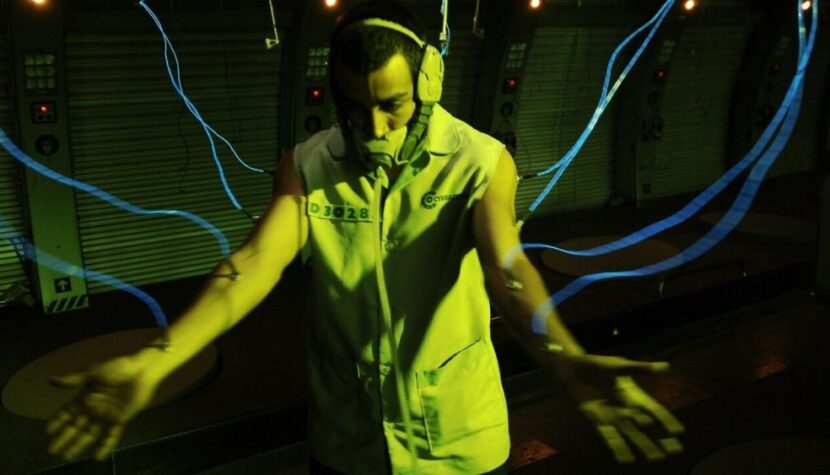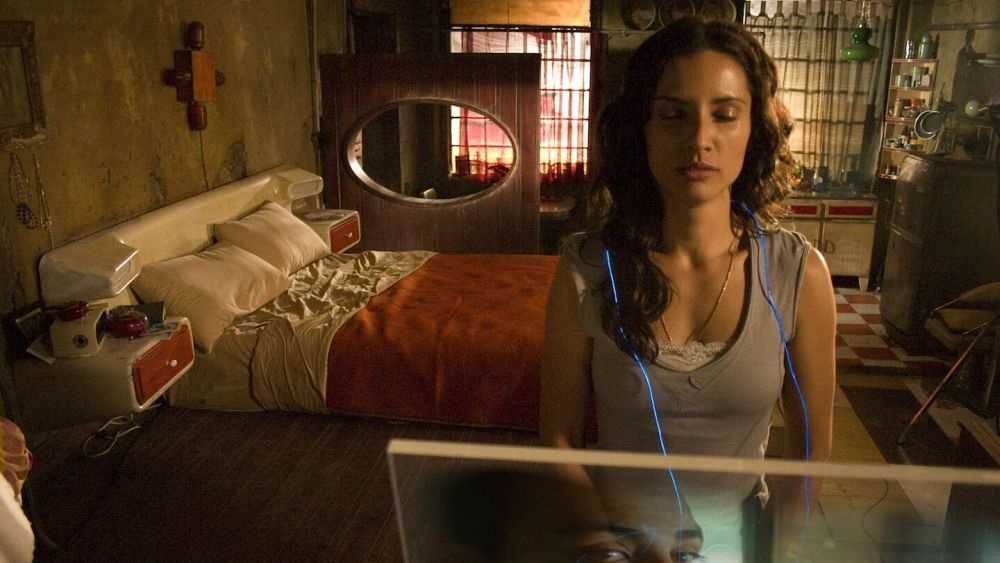SLEEP DEALER. Dystopian science fiction inspired by, among others, “Blade Runner”

The creators’ great ambitions for “Sleep Dealer” exceeded their modest skills.
In the future, the world becomes militarized and globalized: a giant wall is erected on the Mexico-USA border, water reserves are privatized, heavy physical labor is performed by robots remotely controlled by unskilled labor (called “sleep dealers”) in other countries, and the latest trend is a digital network allowing people to experience others’ sensations in virtual reality. Memo Cruz lives in a small Mexican village with his parents and brother. His father wants him to work on their small family farm, but Memo is more passionate about electronics and hacking. Memo builds an electronic receiver that intercepts phone calls. Unexpectedly, Memo’s equipment picks up the frequency of a military drone patrolling the area around a water reservoir owned by a giant corporation. The drone pilot believes it to be a terrorist act and bombs Memo’s house, killing his father. Memo flees to Tijuana, where he gets a job in a “sleep dealer” factory; on his way to the city, he meets Luz, who creates virtual experiences.

“Sleep Dealer” is the feature film debut of Alex Rivera – a New York filmmaker who had previously made documentaries about the interplay between globalization, migration, technology, and politics [Papapapá (1995), Why Cybraceros? (1997), The Sixth Section (2003), and The Borders Trilogy (2003)]. Rivera, the son of an American woman and a Peruvian immigrant, studied media theory and political science – and these two currents converge in his work, focused on capturing the processes of displacement, social change, the development of digital media, and migration policies. In an interview, the director admitted that he is interested in “how technology can break down borders, from an emotional and empirical perspective, and the ways immigrants use technology.” This interest underpins the screenplay for “Sleep Dealer” – a film inspired by both the geopolitical situation in the world and cinematic classics: Fritz Lang’s “Metropolis” (1927), George Lucas’s “Star Wars” (1977), Ridley Scott’s “Blade Runner” (1982), Gregory Nava’s “El Norte” (1983), and Terry Gilliam’s “Brazil” (1985).
“Sleep Dealer” – even more relevant today
Some threads in Rivera’s film seem even more relevant today than in 2008. The privatization of water is a phenomenon intensifying worldwide (especially in the Southern Hemisphere, but not only – see the infamous words of Peter Brabeck-Letmathe, former Nestlé CEO, about how access to water shouldn’t be a universal human right) and is supported by international organizations like the World Bank and the UN. The wall between Mexico and the USA began construction in 2018 at the initiative of then-President Donald Trump, although, truthfully, the first elements of the barrier between these countries were erected in 1909, and its extension and strengthening over the years have been eagerly supported by both American Republicans (the Bushes) and Democrats (Clinton, Obama). The cheap labor thread, which in the USA performs the most dangerous jobs, has been modernized: it’s no longer Latin American immigrants toiling on construction sites but robots controlled by them. As one character says, this system gives the USA what it always wanted: “all the work without the workers.”

All these ideas are interesting, but the creators of “Sleep Dealer” lack the skill to tackle them effectively. There was an opportunity for a deeper analysis of a dystopian reality that humanity might face, but Rivera only skims the surface of these phenomena. To make matters worse, his film quickly transforms from a grim dystopia into a clichéd story of love and revenge that could take place at any time and place. The characters are very poorly outlined, barely sketched, and thus completely one-dimensional. There is almost no chemistry between Memo and Luz – their relationship seems forced and serves only to push the flimsy plot forward. The most absurd, however, is the thread of the drone pilot who killed Memo’s father and then “converts” to help the boy, risking his life, career, and the safety of his loved ones. The final nail in the coffin for “Sleep Dealer” is the low budget resulting in poor special effects and an overall impression of cheapness (and it’s possible to create a great dystopia about corporate capitalism on a shoestring budget, as evidenced by “Paranoia 1.0”). Wasted potential.

